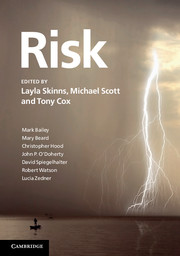Book contents
- Frontmatter
- Contents
- Figures
- Tables
- Acknowledgements
- 1 Introduction
- 2 Quantifying uncertainty
- 3 Decisions, risk and the brain
- 4 Risk and government
- 5 Risk and the humanities
- 6 Terrorism and counterterrorism
- 7 Risk and natural catastrophes
- 8 Risk in the context of (human-induced) climate change
- Notes on the contributors
- Index
- References
6 - Terrorism and counterterrorism
What is at risk?
Published online by Cambridge University Press: 05 June 2012
- Frontmatter
- Contents
- Figures
- Tables
- Acknowledgements
- 1 Introduction
- 2 Quantifying uncertainty
- 3 Decisions, risk and the brain
- 4 Risk and government
- 5 Risk and the humanities
- 6 Terrorism and counterterrorism
- 7 Risk and natural catastrophes
- 8 Risk in the context of (human-induced) climate change
- Notes on the contributors
- Index
- References
Summary
Social scientists tell us we live in a ‘world risk society’. But what does this mean post 9/11? By any account the risk to our collective security and, no less importantly, our subjective sense of security, was altered radically by the tragic events of that day. Of course terrorism was far from unknown before 9/11, but it did not occupy the public imagination in the way it has done since. Risk commentators were quick to add terrorist threat to the catalogue of environmental, health and engineering risks, and natural catastrophes already said to characterise the world risk society. But the risks born of terrorism are very different from those posed by climate change and ’flu pandemics. If risk is to avoid becoming an undifferentiated amalgam of unnamed perils we need to think a little harder about what or who is at risk.
This is all the more important because seeking security from terrorism has the quality of a trump card. Play the security hand and countervailing interests, not least our civil liberties, lose out. Despite their rarity, acts of terrorism pose a risk of catastrophic harm that inclines us to accept whatever policies seem to offer some prospect of protection. Although counterterrorist measures may discriminate unfairly and erode civil liberties unwarrantedly, the urge to reduce risk prevails. Balancing liberty and security assumes a zero-sum game in which by eroding liberty we can reduce risk. In place of balancing we would do better to think about the whole range of risks associated with terrorism and consider how seeking to avert risk may have the effect of introducing new hazards. By focusing on the obvious risks – threats to life and property, and subjective insecurity or terror itself – we risk overlooking the fact that countering terrorism carries its own hazards: risks to political and economic life; risks to social cohesion, community and race relations; risks to rights (rights to freedom of speech, privacy and freedom of the person) and risks for the rule of law. Add to this the risk of marginalising and alienating those we target and we arrive at the paradoxical situation that counterterrorism policies may make further attack more, not less, likely. So we need to consider what risks are really at stake when we seek to counter terrorist risk.
- Type
- Chapter
- Information
- Risk , pp. 109 - 130Publisher: Cambridge University PressPrint publication year: 2011
References
- 2
- Cited by

